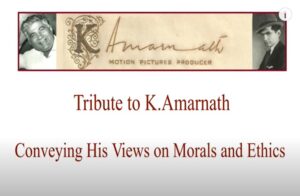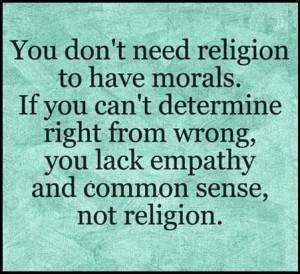14th May 2016
“Remembering our dad, K.Amarnath, today on his 33rd Death Anniversary”
Morals and ethics conveyed in movies produced and directed by Mr. K.Amarnath
![]()
In years gone by, parables, fables and stories were used as powerful tools to teach moral lessons –
Distinction between good and bad behaviour – what is the right or wrong way to behave in a conflicting situation.
“So what is the moral of this story – what did you learn from it?” is how most of these narratives would end.
With the advent of cinema, narrative movies would follow the same trend –
Trying to teach people the principles and values of leading a good and virtuous life.
But most viewers, while watching movies, don’t like to be preached – they just want to be entertained.
My dad, Mr. K. Amarnath upheld very high moral and ethical values, in both, his personal and professional life.
While watching his movies, which were an eclectic mix of romance, fantasy, action, patriotism and humor,
I realized that each one of them also had some meaningful life-lesson subtly blended into the main story.
My dad, through his movies, had conveyed his views & messages on morals & ethics without being preachy or didactic.
![]()
Click on the link below for the YouTube compilation of clips from some of his movies that reflect these views:
https://www.youtube.com/watch?v=dS6yZuwqwOc

![]()
1. Beqasoor – 1950:
Money earned by devious means, such as cheating (the family or the government) and unethical profiting via black-market comes to no good – you can never prosper in life. Both the actors, Yakub and Gope, who are portrayed as Pharmacists indulging in black-market have to eventually pay for their crimes.
Justice prevails! “As you sow, so shall you reap.”
After watching this clip, the concept of KARMA – often called the law of cause and effect – comes to mind.
Good Karma – Bad Karma – Instant Karma !
Though this age-old Sanskrit word “karma” is very complex, it is so commonly and universally used nowadays that it has become a part of the English language.
Understanding the tenets and beliefs of the karmic theory has made many people more aware and responsible for their actions.
2. Bada Admi – 1961:
An honest, conscientious and law-abiding man, portrayed by actor Sheikh Mukhtar, who toils daily for his livelihood is a “bada admi” – a greater and better human being than the wealthy, unscrupulous boss, portrayed by actor Jayant. No amount of money can corrupt him (Sheikh Mukhtar) or veer him from his high principles.
LYRICIST: PREM DHAWAN
अकेला है तो क्या हुआ, ईमान तेरे साथ है,
ना डर तू रास्तों से, के भगवान तेरे साथ है,
जो सच से ना कभी टले, वो ही है बड़ा आदमी.
Akela hai to kya hua, emaan tere saath hai,
Na dar tu raaston se, ke Bhagwan tere saath hai,
Jo sach se na kabhi tale, wo hi hai Bada Admi.
Even if you are alone it should not matter since your honesty is with you. Do not fear as you tread on life’s difficult paths, because God is with you. The person who never sways from the truth is truly the “bigger” person.
3. Ishaara – 1964:
Money amassed by defrauding others doesn’t rightfully belong to you. In this clip, the elder sister (Vyjayantimala) reasons with her younger brother (SubiRaj) that it is never too late to return this illegal money – you can always start all over again.
Individuals with good morals and high professional ethics can teach, inspire and motivate others to follow their example of leading an honest and rewarding life.
***********************

***********************
https://en.wikipedia.org/wiki/Ethics
According to Socrates (469–399 BC) one of the first Greek philosophers:
Evil or bad actions are the result of ignorance…..
If a criminal was truly aware of the intellectual and spiritual consequences of his actions,
He would neither commit nor even consider committing those actions……
A truly wise man knows what is right, will do what is good, and will therefore be happy.
![]()

![]()
MENU |
BACK TO TOP |
